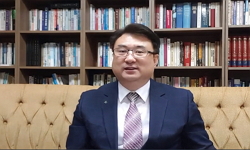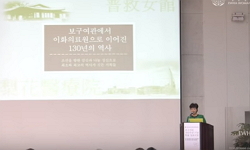This study analyzes the life and thought of Henry G. Appenzeller, American missionary from the perspective of sociology of religion. First of all, it will explore the social situation in which Appenzeller was able to enter Korea as educational mission...
http://chineseinput.net/에서 pinyin(병음)방식으로 중국어를 변환할 수 있습니다.
변환된 중국어를 복사하여 사용하시면 됩니다.
- 中文 을 입력하시려면 zhongwen을 입력하시고 space를누르시면됩니다.
- 北京 을 입력하시려면 beijing을 입력하시고 space를 누르시면 됩니다.
아펜젤러 선교사의 삶에 대한 종교사회학적 해석 = An Interpretation of the Life of Missionary Henry G. Appenzeller - From the Perspective of Sociology of Religion -
한글로보기부가정보
다국어 초록 (Multilingual Abstract)
missionary from the perspective of sociology of religion. First of all, it will explore the
social situation in which Appenzeller was able to enter Korea as educational
missionary and explain the context of Korea's times at home and abroad. This is the
first time that King Gojong's permission of mission was issued to Korea, which needed
U.S. support and help for the imperial expansion of the neighboring powers, enabling
the educational and medical activities of Western missionaries. Before Appenzeller's
successful entry into the country in 1885, there were the financial support from J. F.
Goucher, the persuasion of R. S. Maclay and a help from Kim Ok-kyun. But
Appenzeller paid attention to evangelical spread through education. Secondly, the
death of Appenzeller was too sudden. After the second sabbatical year, Appenzeller
traveled by boat to attend Mokpo meeting of the Bible Translation Committee and
died in a sea disaster. The incident was not just an accident, but a martyrdom that
occurred while trying to rescue the accompanying Koreans. He suffered from rapid
aging as missionary work in Korea expanded. He had a strong will to establish the
best university that taught in the spirit of Christianity. Finally, his missionary work was
concentrated in Pai Chai Hang Dang (Pai Chai College), which nurtured useful people
in the country for democratization and modernization. He pursued education as a
whole, including liberal education and theological education, and practiced traditional
missionary work that emphasized the cooperation between the denominations while
strengthening evangelicalism. A religious and sociological study of his entire life is
needed in the future.
This study analyzes the life and thought of Henry G. Appenzeller, American
missionary from the perspective of sociology of religion. First of all, it will explore the
social situation in which Appenzeller was able to enter Korea as educational
missionary and explain the context of Korea's times at home and abroad. This is the
first time that King Gojong's permission of mission was issued to Korea, which needed
U.S. support and help for the imperial expansion of the neighboring powers, enabling
the educational and medical activities of Western missionaries. Before Appenzeller's
successful entry into the country in 1885, there were the financial support from J. F.
Goucher, the persuasion of R. S. Maclay and a help from Kim Ok-kyun. But
Appenzeller paid attention to evangelical spread through education. Secondly, the
death of Appenzeller was too sudden. After the second sabbatical year, Appenzeller
traveled by boat to attend Mokpo meeting of the Bible Translation Committee and
died in a sea disaster. The incident was not just an accident, but a martyrdom that
occurred while trying to rescue the accompanying Koreans. He suffered from rapid
aging as missionary work in Korea expanded. He had a strong will to establish the
best university that taught in the spirit of Christianity. Finally, his missionary work was
concentrated in Pai Chai Hang Dang (Pai Chai College), which nurtured useful people
in the country for democratization and modernization. He pursued education as a
whole, including liberal education and theological education, and practiced traditional
missionary work that emphasized the cooperation between the denominations while
strengthening evangelicalism. A religious and sociological study of his entire life is
needed in the future.
국문 초록 (Abstract)
가 한국에 교육선교사로 입국할 수 있었던 사회적 상황을 탐구하고, 한국의 국내외 시대
적 맥락을 설명할 것이다. 주변 열강의 제국주의적 팽창에 대하여 미국의 지원과 도움이
필요했던 한국에 고종의 윤허가 내려지면서 서양선교사의 교육과 의료 활동이 가능해졌
다. 1885년에 아펜젤러의 성공적인 입국이 이루어지기 전에, 가우처의 재정지원, 매클레이
의 설득, 김옥균의 도움 등이 있었다. 그러나 아펜젤러는 교육을 통한 복음전파에 관심을
기울였다. 둘째로, 아펜젤러의 죽음은 너무 갑작스럽게 발생하였다. 두 번째 안식년을 마치
고 돌아 온 아펜젤러는 성서번역위원회의 목포모임에 참석하기 위하여 배를 타고 이동하
다가 해난사고로 사망하였다. 이 사건은 단순한 사고가 아니라 동행한 한국인들을 구조하
려다 발생한 순교였다. 그는 한국의 선교가 확장되면서 건강이 쇠약해졌고 급속한 노화를
경험하였다. 그는 기독교정신으로 가르치는 최고 수준의 대학교를 설립하려는 강한 의지
를 갖고 있었다. 끝으로, 그의 선교활동은 배재학당에 집중되어 있었는데, 민주화와 근대화
를 위한 국가에 유용한 인재를 양성하기를 원하였다. 교양교육과 신학교육을 포함한 전인
적인 교육을 지향하였고 복음주의를 강화하면서도 교파간의 협력을 중시하는 통전적 선교
를 실천하였다. 앞으로, 그의 전 생애에 대한 종교사회학적 재평가가 필요하다.
본 연구는 아펜젤러 선교사의 생애와 사상을 종교사회학적 관점에서 분석한다. 우선, 그 가 한국에 교육선교사로 입국할 수 있었던 사회적 상황을 탐구하고, 한국의 국내외 시대 적 맥락을 ...
본 연구는 아펜젤러 선교사의 생애와 사상을 종교사회학적 관점에서 분석한다. 우선, 그
가 한국에 교육선교사로 입국할 수 있었던 사회적 상황을 탐구하고, 한국의 국내외 시대
적 맥락을 설명할 것이다. 주변 열강의 제국주의적 팽창에 대하여 미국의 지원과 도움이
필요했던 한국에 고종의 윤허가 내려지면서 서양선교사의 교육과 의료 활동이 가능해졌
다. 1885년에 아펜젤러의 성공적인 입국이 이루어지기 전에, 가우처의 재정지원, 매클레이
의 설득, 김옥균의 도움 등이 있었다. 그러나 아펜젤러는 교육을 통한 복음전파에 관심을
기울였다. 둘째로, 아펜젤러의 죽음은 너무 갑작스럽게 발생하였다. 두 번째 안식년을 마치
고 돌아 온 아펜젤러는 성서번역위원회의 목포모임에 참석하기 위하여 배를 타고 이동하
다가 해난사고로 사망하였다. 이 사건은 단순한 사고가 아니라 동행한 한국인들을 구조하
려다 발생한 순교였다. 그는 한국의 선교가 확장되면서 건강이 쇠약해졌고 급속한 노화를
경험하였다. 그는 기독교정신으로 가르치는 최고 수준의 대학교를 설립하려는 강한 의지
를 갖고 있었다. 끝으로, 그의 선교활동은 배재학당에 집중되어 있었는데, 민주화와 근대화
를 위한 국가에 유용한 인재를 양성하기를 원하였다. 교양교육과 신학교육을 포함한 전인
적인 교육을 지향하였고 복음주의를 강화하면서도 교파간의 협력을 중시하는 통전적 선교
를 실천하였다. 앞으로, 그의 전 생애에 대한 종교사회학적 재평가가 필요하다.
목차 (Table of Contents)
- Ⅰ. 서론 1
- Ⅱ. 선교윤허(宣敎允許)의 배경 2
- Ⅲ. 선교사의 죽음: 사고인가? 순교인가? 4
- Ⅳ. 배재학당과 기독교대학교의 탄생 6
- Ⅴ. 결론: 순교자의 탄생과 선교의 비전 8
- Ⅰ. 서론 1
- Ⅱ. 선교윤허(宣敎允許)의 배경 2
- Ⅲ. 선교사의 죽음: 사고인가? 순교인가? 4
- Ⅳ. 배재학당과 기독교대학교의 탄생 6
- Ⅴ. 결론: 순교자의 탄생과 선교의 비전 8
- 참고문헌 10
- Abstract 11
동일학술지(권/호) 다른 논문
-
- 培材大學校 社會科學硏究所
- 김상욱
- 2019
-
일본의 수출규제와 한국의 부품·소재산업 경쟁력 강화 방안
- 培材大學校 社會科學硏究所
- 강철구
- 2019
-
- 培材大學校 社會科學硏究所
- 김양주
- 2019




 RISS
RISS






